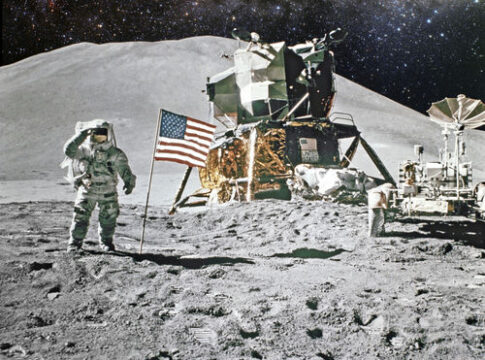NASA’s Artemis II mission announcement reignites conspiracy theories, questioning the authenticity of lunar landings and even the existence of space.
Artemis II Mission Details
NASA plans to launch the Artemis II mission in February 2026, marking the first crewed lunar flyby in over 50 years. The mission aims to test the systems needed for future lunar landings, as astronauts will travel 5,700 miles past the moon without landing. This mission is an essential step toward the Artemis III mission, which is expected to land on the moon in 2027.
Artemis II is launching in early 2026. You coming with?
Now you can. Submissions are open to fly your name around the Moon.
Your name will be recorded on a memory card that will be stowed inside the Orion spacecraft. Sign up here: https://t.co/5nu5GdtPvo pic.twitter.com/ZvB1Mf4oL5
— NASA (@NASA) September 9, 2025
Despite the clear scientific goals of Artemis II, conspiracy theories have gained traction online. Critics question why NASA cannot replicate the 1969 moon landing, fueling skepticism about the authenticity of lunar missions. This skepticism has been amplified by social media, where claims of faked moon landings and even the denial of space’s existence are shared widely.
Conspiracies Gain Ground
The Artemis II mission announcement has sparked a resurgence of conspiracy theories. Many skeptics argue that if NASA can send astronauts to the moon in the ’60s, then similar missions should be routine today. The lack of a planned lunar landing for Artemis II has been misinterpreted by some as evidence that past moon landings were staged.
Nasa is planning the first crewed mission to the Moon in fifty years, set to blast-off in February 2026. 🚀
The Artemis II mission is the second launch of the Artemis programme, whose aim is to land astronauts and eventually establish a long-term presence on the lunar surface.… pic.twitter.com/haBiCY5Hnc
— BBC World Service (@bbcworldservice) September 24, 2025
Some theorists even claim that space itself is an elaborate hoax, designed to conceal the truth about Earth’s flatness. This resurgence of conspiracy theories highlights a broader distrust in scientific institutions and governmental agencies, despite overwhelming physical evidence and historical documentation supporting the moon landings.
Evidence vs. Skepticism
Physical evidence from the Apollo missions, such as lunar rock samples and retroreflectors, supports the reality of past moon landings. However, conspiracy theories persist, partly driven by online echo chambers. Studies show that belief in moon landing conspiracies has grown, with a significant percentage of Americans doubting these historical events.
The persistence of these theories underscores the challenge of combating misinformation in the digital age. As NASA continues its lunar exploration efforts, the agency faces the dual task of advancing space exploration while addressing public skepticism.


We should have been back on the Moon in 2000, but better late than never. As for the flat Earth believers, Sir Isaac Newton says otherwise.